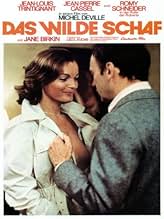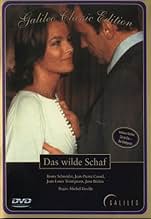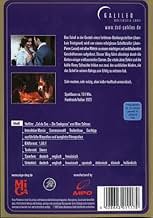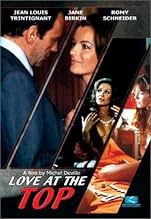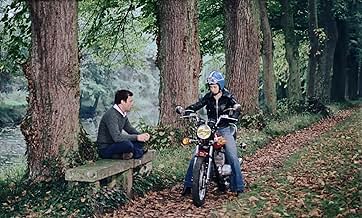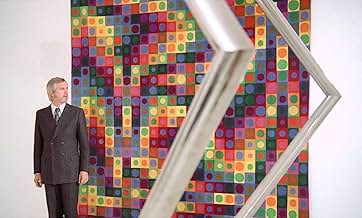IMDb-BEWERTUNG
6,7/10
2211
IHRE BEWERTUNG
Eine zynische Tragikomödie über die verschiedenen Arten der Liebe in den Zeiten der sexuellen Revolution.Eine zynische Tragikomödie über die verschiedenen Arten der Liebe in den Zeiten der sexuellen Revolution.Eine zynische Tragikomödie über die verschiedenen Arten der Liebe in den Zeiten der sexuellen Revolution.
- Regie
- Drehbuch
- Hauptbesetzung
Empfohlene Bewertungen
"Like the first touch of pleasure and guilt, like a spontaneous youthful flirt of fascination and fear, like a climax of contrary emotions" said one of the movie buffs after viewing LOVE AT THE TOP, the misinterpreted title version of stylish director Michel Deville's LE MOUTON ENRAGE.
Vincent Canby in New York Times, however, just after the 1974 premiere of the movie stated: "LOVE AT THE TOP which opened yesterday at the 68th Street Playhouse, is a 1973 French comedy that dimly recalls a number of nineteen-fifties English comedies about the rise and rise of cynical young men possessing—and possessed by—ambition." Yet, the significant difference that he mentioned was the fact that LOVE AT THE TOP is not concerned with the English class system...(January 27, 1975)
Having left the evaluations up to single individuals, of course, the test of time has done its just job. What may be said with certainty after more than 30 years is that we can hardly find such movies like LE MOUTON ENRAGE where decadence appears innocent, where liaisons appear youthfully enthusiastic, where feelings occur so manipulative.
For Romy Schneider's fans, it seems useless to point out that this film is a must see, not only because she gives a unique performance (as she did in all of her roles) at the heyday of her career (9 years before her sudden death) but because she is particularly attractive here. It is not TRIO INFERNAL where the, so to say, 'forced escape' from and the mockery of Romy's sweet image haunted for years by saccharine Sissi meets its most discouraging manifestation, but a film where the brilliant actress is given a fair role. She plays Roberte, a woman who becomes the object of lust for the story's lead, playboy Nicolas Mallet (Jean Louis Trintignant). It is him who takes financial profits from lustful liaisons. This movie can boast truly memorable and unique shots of Romy and she is given some of her very best scenes. Romy's sex appeal is unforgettable here.
Another strong point of the film is its execution of the content with a development of individual perception. Immoral as it may seem, the director makes a perfect use of contrast: conventions vs pleasures, innocence vs decadence, genuine lust vs instrumental affair. Nicola owns most of the features that viewers may like or detest, may find attractive or disgusting; yet, his are the features the viewers must treat seriously, more to say, they are the ones we all must accept. That is why, one is led to a peculiar, gently wild, erotically unique world of the main character. Although he sleeps with lots of women, there are two women that represent a sort of contrary worlds for Nicola: Roberte Groult (Romy Schneider) and Marie-Paul (Jane Birkin). He manipulates them, makes love to them, cannot refrain from both desire for their bodies and desire for money; yet, he perceives them differently. Yet, despite all of this 'adult maturity,' he is emotionally like a little boy who plays with a toy-car on the table - a sort of 'detailed insight into male mind...' in a comedy-like way, of course.
Finally, there are very good performances, which makes LE MOUTON ENRAGE slightly underrated. Not only the aforementioned Romy Schneider does a brilliant job supplying the viewers with an extraordinary insight into her role, but young Jane Birkin appears to be convincing in the role of young, inexperienced streetwalker Marie Paul, Jean Louis Trintignant makes it possible to see Nicola in the right way. This artistic merit lying in performances goes with terrific music by Camille Saint-Saëns, the tune that will ring in your ears for long. Therefore, apart from some flaws of the movie like dated colors, slow action (sometimes), possible clichés (noticed by some viewers), the merits should be found significant.
LE MOUTON ENRAGE, in sum, is a clear manifestation of contrary manipulative tools in life. It is worth seeing as a moment in Romy's career, a prelude to strong eroticism, a chain of contrary emotions, of love and hatred, appreciation and disgust compared to the first orgasm and the first angasm... But aren't we, humans, 'viewers,' movie buffs built upon such contrasts?
Vincent Canby in New York Times, however, just after the 1974 premiere of the movie stated: "LOVE AT THE TOP which opened yesterday at the 68th Street Playhouse, is a 1973 French comedy that dimly recalls a number of nineteen-fifties English comedies about the rise and rise of cynical young men possessing—and possessed by—ambition." Yet, the significant difference that he mentioned was the fact that LOVE AT THE TOP is not concerned with the English class system...(January 27, 1975)
Having left the evaluations up to single individuals, of course, the test of time has done its just job. What may be said with certainty after more than 30 years is that we can hardly find such movies like LE MOUTON ENRAGE where decadence appears innocent, where liaisons appear youthfully enthusiastic, where feelings occur so manipulative.
For Romy Schneider's fans, it seems useless to point out that this film is a must see, not only because she gives a unique performance (as she did in all of her roles) at the heyday of her career (9 years before her sudden death) but because she is particularly attractive here. It is not TRIO INFERNAL where the, so to say, 'forced escape' from and the mockery of Romy's sweet image haunted for years by saccharine Sissi meets its most discouraging manifestation, but a film where the brilliant actress is given a fair role. She plays Roberte, a woman who becomes the object of lust for the story's lead, playboy Nicolas Mallet (Jean Louis Trintignant). It is him who takes financial profits from lustful liaisons. This movie can boast truly memorable and unique shots of Romy and she is given some of her very best scenes. Romy's sex appeal is unforgettable here.
Another strong point of the film is its execution of the content with a development of individual perception. Immoral as it may seem, the director makes a perfect use of contrast: conventions vs pleasures, innocence vs decadence, genuine lust vs instrumental affair. Nicola owns most of the features that viewers may like or detest, may find attractive or disgusting; yet, his are the features the viewers must treat seriously, more to say, they are the ones we all must accept. That is why, one is led to a peculiar, gently wild, erotically unique world of the main character. Although he sleeps with lots of women, there are two women that represent a sort of contrary worlds for Nicola: Roberte Groult (Romy Schneider) and Marie-Paul (Jane Birkin). He manipulates them, makes love to them, cannot refrain from both desire for their bodies and desire for money; yet, he perceives them differently. Yet, despite all of this 'adult maturity,' he is emotionally like a little boy who plays with a toy-car on the table - a sort of 'detailed insight into male mind...' in a comedy-like way, of course.
Finally, there are very good performances, which makes LE MOUTON ENRAGE slightly underrated. Not only the aforementioned Romy Schneider does a brilliant job supplying the viewers with an extraordinary insight into her role, but young Jane Birkin appears to be convincing in the role of young, inexperienced streetwalker Marie Paul, Jean Louis Trintignant makes it possible to see Nicola in the right way. This artistic merit lying in performances goes with terrific music by Camille Saint-Saëns, the tune that will ring in your ears for long. Therefore, apart from some flaws of the movie like dated colors, slow action (sometimes), possible clichés (noticed by some viewers), the merits should be found significant.
LE MOUTON ENRAGE, in sum, is a clear manifestation of contrary manipulative tools in life. It is worth seeing as a moment in Romy's career, a prelude to strong eroticism, a chain of contrary emotions, of love and hatred, appreciation and disgust compared to the first orgasm and the first angasm... But aren't we, humans, 'viewers,' movie buffs built upon such contrasts?
As the title of Michel Deville's film translates as the singularly uninviting 'The Rabid Sheep', there have naturally been a few alternatives, the most inappropriate of which must surely be 'Love at the Top'. Whoever thought that one up might perhaps have had in mind the earlier 'Room at the Top' and its sequel but Laurence Harvey's social climber Joe Lampton is a positive milquetoast compared to the Nicholas Mallet of Jean-Louis Trintignant. Monsieur Trintignant utilises his innate shyness and natural charm to great effect here so as to make his character less loathsome.
This film is the first of Deville's loosely connected trilogy that was to continue with the dark and disturbing 'Eaux Profondes' and culminate in his most accomplished, critically acclaimed and commercially successful 'Péril en la Demeure'. Of the three it is the most scathing and cynical and for this viewer at any rate, the weakest.
Trintignant's character is a latter day Bel Ami and the women he beds show precious little resistance, notably the enchanting nymphet of Jane Birkin who becomes remarkably docile after being clipped round the chops by our hero, gorgeous Romy Schneider's bored wife who pays the ultimate price for her infidelity, cougar Florinda Bolkan who paddles with both feet and septuagenerian Mary Marquet!
By far the most fascinating character and one that supplies the film's darkest element is the crippled writer Claude of Jean-Pierre Cassel, a near devilish personality who guides Nicholas on his way to sexual and financial success as well as living a life by proxy as he obviously covets his protegé's conquests. An astute critic has observed that Cassel and Trintignant could so easily have swapped roles.
Deville's preferred editor Raymonde Guyot guarantees a brisk pace whilst the excellent use of the music of Saint-Saens, notably his Third Symphony, reminds us that he is credited with writing the first film score for 'L'Assassinat du Duke de Guise' in 1908.
Is there a moral to the tale? 'Be careful what you wish for....' would seem the most apt.
This film is the first of Deville's loosely connected trilogy that was to continue with the dark and disturbing 'Eaux Profondes' and culminate in his most accomplished, critically acclaimed and commercially successful 'Péril en la Demeure'. Of the three it is the most scathing and cynical and for this viewer at any rate, the weakest.
Trintignant's character is a latter day Bel Ami and the women he beds show precious little resistance, notably the enchanting nymphet of Jane Birkin who becomes remarkably docile after being clipped round the chops by our hero, gorgeous Romy Schneider's bored wife who pays the ultimate price for her infidelity, cougar Florinda Bolkan who paddles with both feet and septuagenerian Mary Marquet!
By far the most fascinating character and one that supplies the film's darkest element is the crippled writer Claude of Jean-Pierre Cassel, a near devilish personality who guides Nicholas on his way to sexual and financial success as well as living a life by proxy as he obviously covets his protegé's conquests. An astute critic has observed that Cassel and Trintignant could so easily have swapped roles.
Deville's preferred editor Raymonde Guyot guarantees a brisk pace whilst the excellent use of the music of Saint-Saens, notably his Third Symphony, reminds us that he is credited with writing the first film score for 'L'Assassinat du Duke de Guise' in 1908.
Is there a moral to the tale? 'Be careful what you wish for....' would seem the most apt.
Michel Deville was of the same generation as Truffaut, Chabrol and Godard, but resembles them not at all. He seems to belong to an older generation, like Carne and Renoir, but much more eroticized. The story is that of mentor and student (sort of Svengali and Trilby, but with two men). The homosexual undercurrent of the story should not be too hard to see for most viewers. Trintignant is the shy 'sheep' of the title, his overbearing mentor, who has emotional problems owing to his club foot, is Cassel, one of his most impressive performances.
I don't know who is really the female lead--is it Birkin or Schneider? They both have very important roles. Florinda Bolkan, so great in Investigation of a Citizen..., has another memorable role here. Mary Marquet, almost 80 at the time, has a superb cameo as the very rich woman Trintignant has to romance.
I don't know who is really the female lead--is it Birkin or Schneider? They both have very important roles. Florinda Bolkan, so great in Investigation of a Citizen..., has another memorable role here. Mary Marquet, almost 80 at the time, has a superb cameo as the very rich woman Trintignant has to romance.
It is just a beautiful film. Not exactly in ordinary manner who you expect - sure the cast is more than impressive, the dialogues are just fair, the satire works more than seductive, the dream , animating many from us , reminding a sort of Vicomte de Valmont and pure intelectual voyerism are admirable good points- but for situations, cliches reinvented in wise manner, for the magnificent end and for references to so many familiar situations from literature and cinema.
An ordinary man, working in a bank, after two meetings with a young girl becomes the subject of a sort of social experiment of his friend.
This is all, in fact, and you become part of each step of the way , with dramatic to terrible consequences of a functionary beginning a different life in profound sense.
In short, just a gem.
An ordinary man, working in a bank, after two meetings with a young girl becomes the subject of a sort of social experiment of his friend.
This is all, in fact, and you become part of each step of the way , with dramatic to terrible consequences of a functionary beginning a different life in profound sense.
In short, just a gem.
LOVE AT THE TOP--the utterly wrongheaded American title for the superb French film "Le Mouton Enrage" (which means, I think, The Rabid Sheep)-- is such an original movie, the fact that it dates back to 1974 seems all the more astounding. This film was far ahead of its time; even by today's highest standards, it accomplishes things that seem rich and new. Filmed by the hugely underrated director Michel Deville, it rather defies description in the way it combines social critique, comedy, mystery, love, sex and satire into one wholly original mix--leaving for the end a major but subtle surprise to render all that has gone before suddenly sad and more understandable. The cast is splendid, ditto the writing and theme. But it's Deville's delicious tone, keeping you constantly off-balance but enrapt, that pushes this "lost" film to a very high level indeed. (The written interview with the director on the "Special Features" section of the DVD is definitely worth reading if you have the time.)
Wusstest du schon
- WissenswertesJane Birkin said she asked Jean-Louis Trintignant to hit her for real in a scene. "My first scene was rather difficult: I was naked in front of Trintignant in the hotel room. Moreover, in the script, it was written that he was kissing my breasts. I thought: My God, he has fallen badly! I was ashamed. Only one thing helped me: he had to slap me and make me fall on the floor. Now, when you get a slap on the mouth, your mouth becomes like cotton when you say the next lines. I had to say, 'You have a little bike in your head'. My mouth hurt and I said it in a cottony way. Unfortunately, we had to double the scene because of the camera noise, and I couldn't do it as well. I would have had to get a grip on myself! Today, I wouldn't hesitate to do it. Trintignant was nice, he didn't want to hurt me. I wanted him to hurt me, I begged him to hit me," Birkin recalled.
- VerbindungenReferenced in Night Train - Der letzte Zug in der Nacht (1975)
Top-Auswahl
Melde dich zum Bewerten an und greife auf die Watchlist für personalisierte Empfehlungen zu.
- How long is Love at the Top?Powered by Alexa
Details
- Erscheinungsdatum
- Herkunftsländer
- Sprache
- Auch bekannt als
- Love at the Top
- Drehorte
- Jardin des Batignolles, Paris 17, Paris, Frankreich(park where Nicolas meets Marie-Paule)
- Produktionsfirmen
- Weitere beteiligte Unternehmen bei IMDbPro anzeigen
- Laufzeit1 Stunde 45 Minuten
- Sound-Mix
- Seitenverhältnis
- 1.66 : 1
Zu dieser Seite beitragen
Bearbeitung vorschlagen oder fehlenden Inhalt hinzufügen

Oberste Lücke
By what name was Das wilde Schaf (1974) officially released in India in English?
Antwort

